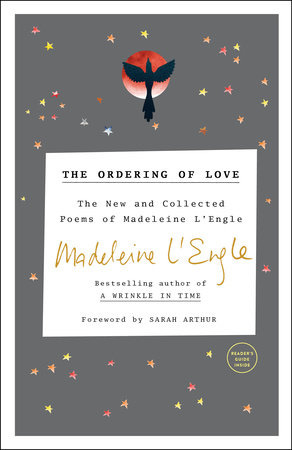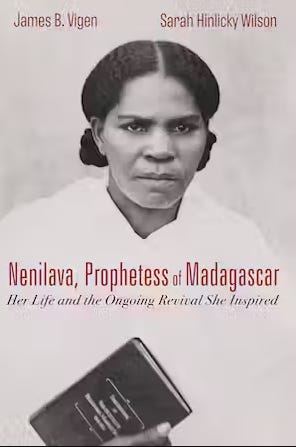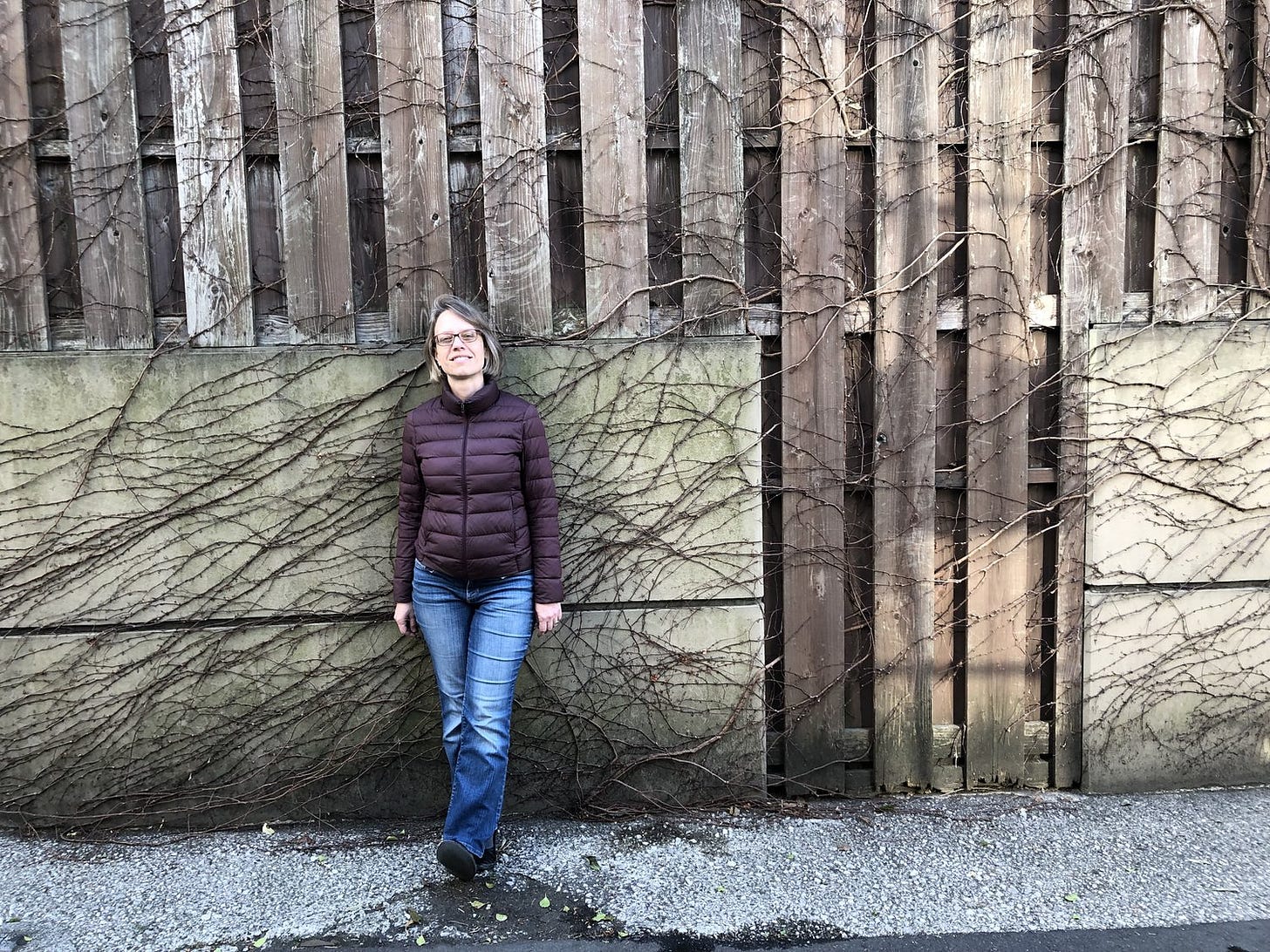FireFall Vol. 11: Be Encouraged By Testimony
Rev. Sherin Swift's practical ministry insights; L'Engle's poetry; Nenilava, Prophetess of Madagascar and Dr. Sarah Hinlicky Wilson; and Dr. Sarah Williams at Anglican Deaconess Ministries
Welcome to this week’s roundup of resources by, for, and about women leading in ministry and the academy! We have practical ministry advice, insights from the arts, a glimpse of the life of a woman who led revivals in Madagascar, and a deep-dive video on prayer, justice, and Josephine Butler. Every week as I curate a few resources to share, I inevitably come away from it encouraged. How can I not, when I’m spending time in the testimonies and lives of other women leading in the body of Christ?
If you need some encouragement, I pray you find some below.
God, anoint my sisters for Your work this week, and set them free to receive quiet joy and sustaining encouragement. Amen.
Pump Up the Jam: FireFall Audio on the Go
You’re busy - often, multitasking. If you want to listen to FireFall rather than read, check out the audio embed at the top of the weekly newsletter.
Sherin Swift: “Nine Lessons for Christian Leaders (Who Also Happen to Be Female)”
Rev. Sherin Swift shares some excellent insights in this Missio Alliance article: warm-hearted pragmatism you might find over a cup of coffee. This is pastoral care for pastors, and Pastor Sherin is honest, sets reasonable expectations, and coaches you forward with hope.
On ministry for the long-haul, she comments, “Finding safe, honest community is essential, and it will require real effort.” She doesn’t downplay the challenge but nuances the importance of this like a driving instructor explaining how to navigate an obstacle course.
“You will have people that support and encourage you as you pursue your calling to ministry leadership, but this need for support is greater than simply finding egalitarian spaces that allow you to serve God in fullness. You will need to find like-minded women in ministry that will walk with you through many seasons of life and are willing to maintain that connection in spite of distance and jobs.
Initially, you might meet them in seminary spaces or denominational gatherings, but ultimately you are bound to each other in ways that will transcend the resume gaps and never-ending church politics. These are the women that will help you see if you are letting ubiquitous gender dynamics limit you unnecessarily, while giving you honest feedback, encouraging you…”
Rev. Swift links the “how” of the obstacle course with the “why”: “If you want to grow in your gifts and vocation, you will need these relationships to counteract the wear and tear of male-dominated spaces.”
Back up to that phrase: “the wear and tear of male-dominated spaces.” That captures it: like the “wear and tear” on a vehicle. Note what she’s not saying; she’s not saying it only happens in complementarian spaces. And of course, she’s right.
That’s it, I’m officially a Swiftie.
Honor is healing: watch how Rev. Swift names something, and in doing so, honors it:
“You are a trailblazer too, even if you are not the first woman _______ (fill in the blank: pastor on staff, lead pastor, teaching pastor, ordained woman, etc.). Once again, your path will not look like your male counterparts. Whether it appears this way on the surface or not, you are a trailblazer, even when there are women who went before you. This is not a point of pride necessarily, but more of a caution that this will be harder for you. Being the second, third or fourth women walking the path of pastoral leadership before you still means there are limited examples ahead of you.” Receive that word, trailblazers.
Friends, go read the rest of Rev. Swift’s beautiful pastoral counsel for you here at Missio Alliance.
From her bio: Sherin Mathew Swift is the Connections and Equipping Pastor at New Life Fellowship, a multiethnic church in Queens, NYC. With a unique perspective as a former atheist and abuse survivor, she has a particular concern for those who have their faith disrupted by trauma and suffering as well as for those who have stagnated in their faith journey. She shares that passion through preaching, teaching, and writing. She completed her MDiv at Alliance Theological Seminary and was ordained by the Evangelical Covenant Church in 2021. You can find her on Instagram @sherinswift.
Breaking Bread with the Arts: The Startling Poetry of Madeleine L’Engle
Are you weary? Recently I bumped into something I wrote in 2020 and found L’Engle re-feeding my soul.
“What voice can sound clearly through the chaos? We live in a moment aching for the holy iconoclasm of the poetry of Madeleine L’Engle,” who, “showed a knack for discomforting the comfortable and soothing the overheated. Her poems, “bear the time signature of sacred rhythms: liturgical seasons, lectionary readings, high water marks of living, like births, weddings, baptisms, deaths. Others cobble amusing little sketches of the absurd habits of selfishness, or glee, or fear, or comfort. She speaks to God as brashly and fearfully as a child who dares to shout at her parent before bursting into tears. Her joy, rage, mirth, and disappointment are pinned into place with her regular, irresistible return to Creation, Collapse, Incarnation, Crucifixion, Resurrection…best known for books on time travel, Madeleine L’Engle shakes us awake.”
In an excerpt from “Lines Scribbled on an Envelope While Riding the 104 Broadway Bus,” she hovers between her time and our own:
There is too much pain
I cannot understand
I cannot pray
Here I am
and the ugly man with beery breath beside me reminds me that
it is not my prayers that waken your concern, my Lord;
my prayers, my intercessions are not to ask for your love
for all your lost and lonely ones,
your sick and sinning souls,
but mine, my love, my acceptance of your love.
Your love for the woman sticking her umbrella and her expensive
parcels into my ribs and snarling, “Why don’t you watch where
you’re going?”
Your love for me, too, too tired to look with love,
too tired to look at Love, at you, in every person on the bus.
Expand my love, Lord, so I can help to bear the pain…
In one my all-time favorites, she rages like a heart-broken child – but potent imagery turns her inside-out. “In a year when suffering, depression, and despair threaten to blow the lid off of theoretical pondering on theodicy and the problem of evil, L’Engle charges in where churchgoers fear to tread, in these selections from ‘Love Letter’ - ”
I hate you, God.
Love, Madeleine
I write my message on water
and at bedtime I tiptoe upstairs
and let it flow under your door.
When I am angry with you
I know that you are there
even if you do not answer my knock
even when your butler opens the door an inch
and flaps his thousand wings in annoyance
at such untoward interruption
and says that the master is not at home.
I cannot turn the other cheek
It takes all the strength I have
To keep my fist from hitting back
the soldiers shot the baby
the little boys trample the old woman
the gutters are filled with groans…
I’m turning in my ticket
and my letter of introduction.
You’re supposed to do the knocking. Why do you burst my heart?
I take hammer and nails
and tack my message on two crossed pieces of wood:
Dear God
is it too much to ask you
to bother to be?
Just show your hindquarters
and let me hear you roar.
Love,
Madeleine
In a poignant reflection for Advent, “her thundering world gave way to these lines from ‘First Coming’ - ”
He did not wait till the world was ready,
till men and nations were at peace.
He came when the Heavens were unsteady,
and prisoners cried out for release.
Explore the entirety of these and many other gripping poems bursting with visceral truth in The Ordering of Love: The New & Collected Poems of Madeleine L’Engle. Read the entirety of “The Startling Poetry of Madeleine L’Engle” here.
“Nenilava, Prophetess of Madagascar: Her Life and the Ongoing Revival She Inspired”
Dr. Sarah Hinlicky Wilson is an engaging communicator and curious scholar generally found living in various places around the world. She’s Lutheran, pursues ecumenical projects, and has the wide-ranging interests of someone who reads a lot. She’s also a prolific writer and I’m delighted to share her book on a woman who led in the church in Madagascar. Nenilava, Prophetess of Madagascar is available from Wipf & Stock. Her collaborator on the book, James B. Vigen, was a missionary in Madagascar for years and met Nenilava. For a shorter glimpse into Nenilava’s life, check out Dr. Hinlicky Wilson’s blog.
There, she writes, “Young Volohavana kept having dreams—powerful, moving dreams—but she could not understand them. Nothing in her small farming village along the southeastern coast of Madagascar could explain what she was seeing.
The dreams started when she was ten. A tall man placed her in a basin of water and washed her feet. After drying them, he rocked her gently to sleep. In another dream, he caught her in a net and then led her up to heaven. In yet another, he brought her to a church and up into the pulpit. He preached and told her that one day she would do the same.
Sometimes the dreams ceased altogether but then, during the day, she would hear a voice calling her name. At first she thought it was her parents, but they denied it and worried she might be losing her mind. She sensed somehow that the voice of the divine was calling out to her, but she didn’t know how to draw nearer to God. She gave up playing with other children and sat alone under a tree, weeping for want of God’s presence.”
Hinlicky Wilson traces Nenilava’s remarkable ministry, and a fascinating testimony unfolds – while also plumbing the fascinating overlap of charismatic ministry within the Lutheran presence in Madagascar.
From the publisher, on the book: “Before she was baptized or knew anything about Christ, young Nenilava was called by Jesus to preach and exorcise in his name. At the age of twenty, newly married to a Lutheran catechist, she heard Jesus prompting her to intervene in a case of demon possession, and from there her ministry spread like wildfire. She spent the next sixty years of her life traveling around her native Madagascar, proclaiming Jesus' victory over sin, guilt, and evil, and bringing countless people to faith. In this book, her firsthand account of her early ministry, as told to a Malagasy pastor, appears for the first time in English. Complementing the immediacy of her narrative, former missionary in Madagascar, James B. Vigen, recounts the last thirty years of Nenilava's life and describes the extraordinary impact of this illiterate peasant woman on African Christianity. Sarah Hinlicky Wilson concludes the book with a far-reaching exploration of demon possession, healing from illness and sin, emergent offices of ministry, and the relevance of Nenilava for Western Christianity.”
Because Dr. Hinlicky Wilson has chosen to disengage from social media and is mindful of privacy in her online footprint, the standard operating procedures of search engine formulas do her an injustice (they favor longevity and a constellation of sources pointing to who you are). If you want to follow her work – and you should – sign up for occasional emails from her.
Watch: “Prayer, Agency, and Cultural Transformation” by Dr. Sarah C. Williams
The last newsletter featured highlights from Sarah Williams’ Plough magazine article on the life and justice work of Josephine Butler, the 19th-century “praying feminist.” In 2020, Williams spoke to women of Australia’s storied Anglican Deaconess Ministries on Prayer as Political Resistance: The Radical Theology of First Wave Feminism. This video is the closing keynote, on Butler and “prayer, agency, and cultural transformation.”
Williams describes wading into Butler’s genteel, tragedy-disrupted life as a “baptism in grief.” She traces Butler’s move toward outcast women through the lens of lament (grief makes outcasts of everyone) and the practices of prayer that shape the imagination and unfold hope.
Butler’s friendships with penny prostitutes not only become space for prayer, justice, and transformation, as she begins to fight unjust legislation used to institutionalize prostitutes; her friends also begin to tell her the names of some of their clients – including well-known church leaders around Butler’s city of Oxford.
This lecture is what I think of as a “bridging” talk. Williams, a British Oxford lecturer, applies her academic background for a lay audience. She’s also translating and sometimes poking fun at abstract theory, connecting it with the embodied history and practices of one woman. With interdisciplinary insight, Williams journeys through Butler’s life, making historiography, epistemology, and theory of change all personal and accessible through a narrative exploration of spiritual formation.
It’s not always easy bridging church and academy but Williams is urgent to do so: prayer and friendship are the practices of today. At the close, she warms into proclamation, issuing a call to approach prayer as part of the work itself – that will not leave us un-transformed.
Williams is British; I would love to pair her work on Butler’s practice of prayer and justice side-by-side or in dialogue with scholars of the American Civil Rights movement.
The lecture begins around the 10-minute mark; it’s around an hour long. I would happily listen to more.
Thank you for supporting FireFall.
Amplify women’s voices – click links, borrow or buy books, leave reviews, include resources in your recommended reading or syllabi, and share this newsletter with women ministering in hard or isolated contexts!








